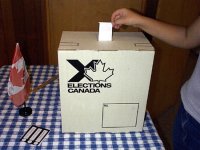
Another interesting piece from the Cato Institute.

 In addition to the poorly-chosen title, the graph is a disaster. Although the count for "Other" is 0, the bar looks like it has a height of 1. There's the usual unnecessary 3D effect. But one of the worst aspects is the way the party names have been placed in shaded bars underneath the bars themselves! One's eye tends to stack each data bar with its title bar, so the visual effect distorts the numbers. Sheesh!
In addition to the poorly-chosen title, the graph is a disaster. Although the count for "Other" is 0, the bar looks like it has a height of 1. There's the usual unnecessary 3D effect. But one of the worst aspects is the way the party names have been placed in shaded bars underneath the bars themselves! One's eye tends to stack each data bar with its title bar, so the visual effect distorts the numbers. Sheesh!

"The sad thing about relying on blogs for information about political choices is that they are high on opinion and low on fact and preach to the choir rather than address issues factually, substantively and inclusively."So says Michael Bugeja, a professor (of journalism, apparently) at Iowa State, as quoted today in an unperceptive Globe and Mail article titled "Wired up, plugged in, zoned out". Bugeja goes on to say that
"We need print newspapers to do that [address issues factually, substantively and inclusively] because the issues requiring factual analysis are more complex than ever and cannot be stated simply in a TV sound bite or Internet news brief."Huh? I thought we were talking about blogs, not TV sound bites.
"In the current Canadian election, more and more people are getting their news via blogs and subscriptions to Web services that align with their own beliefs, so they hear few opposing viewpoints."Um, would it be too much to ask for some evidence that this is the case? I'm not disputing the claim that people are increasingly turning to the Internet for news and opinions. But are they thereby filtering out opposing views?
"The filters and search devices used to make all this information manageable, [many observers say], are isolating people into niches fashioned to their particular tastes and beliefs. Instead of going to common sources, whether newspapers or broadcast TV, to get the daily news, users are getting only the 'daily me'."Pearce notes that American historian Christine Rosen has termed this phenomenon "egocasting". Well there's a buzzword. Never mind that it reverses the roles of the producer and the consumer of information.

Moderator: "In the area of social policy, let's go to health care, which, of course, many Canadians want to know a lot about, and Mr. Duceppe, this question is for you. Provinces including Quebec have increased the role of the private sector in the delivery of health care. Would you support a federal ban on private for-profit health clinics?"But here's something very interesting I stumbled on. The snappy line actually dates back about 7 years! Here's an excerpt from Hansard 171 of the 36th parliament, 1st session, February 1st, 1999 (again, the italics are mine):
Gilles Duceppe: "I mean, I don't want people to have to use their credit card to go to hospital, but the thing is, it is a provincial jurisdiction. It is a Quebec jurisdiction, and a main problem is the fact that the federal government cut in the payment transfers for health since 1994. Recently, they put more money, but not at the level it was in 1994. Just consider that in Ottawa, in the health department, there's 10,000 civil servants, and they're not managing a single hospital. Five years ago, there were 506 employees for promotion, like against cancer or smoking, thing like that. Today nowadays, we have 4,561. We don't need inspectors. We don't need statisticians, we need doctors and nurses. I'm confident the province of Quebec will be able to settle that problem and make sure you go with your health card and not your credit card."
Mrs. Pauline Picard (Drummond, BQ): "Mr. Speaker, the intentions of the federal Minister of Health are clear. He wants to control the provinces' exercise of their constitutional rights with respect to health. Will this federal interference in health matters not mean more public servants, statisticians and inspectors, rather than more doctors, nurses and clinical staff, which is what the public really wants?"I only happened to find this because I did a Google search on duceppe statisticians. And why am I bothering to point this out? Well, it clearly shows that Duceppe's words were pre-planned. Not exactly a shocker: we all know these things are carefully scripted. But the original statement by Pauline Picard was pretty ignorant and I don't think serving it up a second time makes the Bloc Québécois look too good!
Hon. Stéphane Dion (President of the Queen's Privy Council for Canada and Minister of Intergovernmental Affairs, Lib.): "Mr. Speaker, as always, the Government of Canada intends to respect the Constitution fully."
Some hon. members: Oh, oh.
Hon. Stéphane Dion: We intend to work with the provinces in a spirit of respect for the Constitution as it applies to the health sector, just as a certain federal minister wanted to work with the provinces in the education sector 10 years ago.

"The argument most often put forward by detractors of PR is that it will lead to unstable Parliaments in which larger parties are held hostage to the agendas of smaller, special-interest parties, leading to repeated political crises and frequent elections."But ironically, Ibbitson points out, the opposite is true (at least currently in Canada):
"Moving from first-past-the-post to proportional representation would actually make the House of Commons more stable."Based roughly on recent polls, he shows that a likely outcome under PR would be "a stable coalition of the Liberals and the NDP." And he argues that "a PR-based House would also be far more regionally representative." Finally he suggests, as I have, that PR "tends to improve voter turnout, and it more closely represents the popular will."
"If the Green Party, for example, received 5 per cent of the popular vote in the federal election should it also receive 5 per cent of the seats in the House of Commons?"Now I'm pretty skeptical about polls like this that aren't based on random samples. For what it's worth, 57% of the 21075 responses were "Yes". (Confession: one of those responses was mine.)
"Stakes are high as polling suggests Martin and Conservative Leader Stephen Harper are in a statistical dead heat, leading observers to warn an ugly fight for dominance lies just ahead. And that means NDP supporters who fear a Conservative win could become crucial in the Jan. 23 vote as some consider shifting alliances to tip the balance in the Liberals' favour, says the latest Decima Research survey."Former NDP leader Ed Broadbent recently discussed specific proposals for proportional representation in an Edmonton Journal article titled "A democratic idea whose time has come". Definitely worth reading.
"to protect and improve Canadian sovereignties and democracy through education, dialogue, and advocacy, especially using existing and emerging communications tools."They go on to say:
"We believe that Canada should maintain a position as a responsible and involved global citizen, and we support the continued development of a socially progressive Canadian society. We remain committed to the value of democratic decision-making, the value of citizen's rights over those of corporations, the value of reciprocal solidarity with other self-determination movements and/or organizations around the world, and the value of cultural diversity."Amen.